How These Two Women Finally Exposed Harvey Weinstein
Jodi Kantor and Megan Twohey's New York Times report led to the powerful Hollywood producer's fall—and ignited a national conversation on sexual assault.

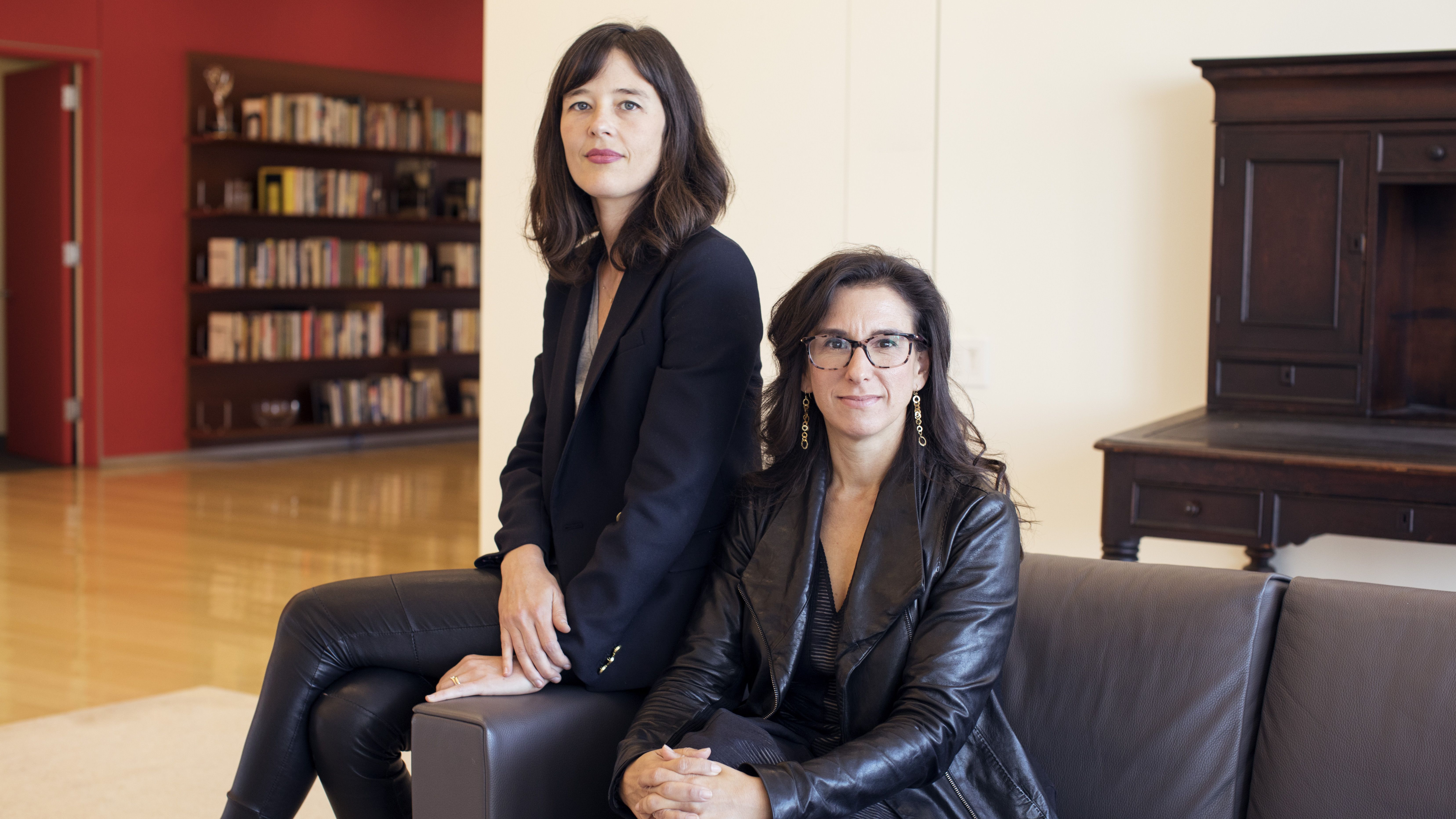
For decades Hollywood has whispered about Harvey Weinstein and his alleged impropriety. Journalists sniffed around, but none ever could—or, perhaps, would—bring one of the industry’s darkest and longest-kept secrets to light. Until just over two weeks ago, when New York Times investigative reporters Jodi Kantor and Megan Twohey delivered a chilling exposé detailing 30 years of sexual harassment and assault accusations against the 65-year-old Miramax and Weinstein Company co-founder. It sent shockwaves.
They’ll both give you the same response: They did it for their daughters.
“You never know what'll happen when you launch your story into the world,” says Kantor, 42. It’s a Tuesday afternoon at the newspaper’s Eighth Avenue headquarters and she's sitting with Twohey, side by side on a couch in the executive suite, recounting the startling revelations they uncovered—not just in their reporting but in the overwhelming response that followed. Twohey, 40, nods: “It’s been explosive.”
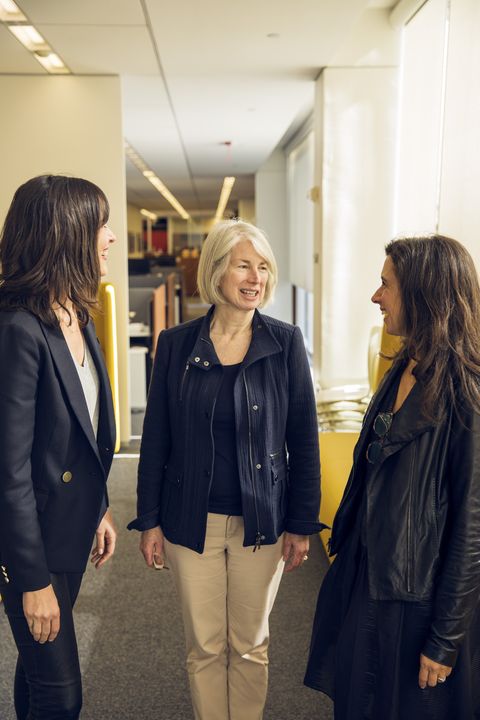
Twohey (left) and Kantor (right) with their editor, Rebecca Corbett
Dozens of A-listers have since opened up about unwanted sexual advances from Weinstein. He's been sacked from his own company, expelled from the Academy of Motion Picture Arts and Sciences, and may yet face criminal charges. And beyond Hollywood, women everywhere have come forward to share their own experiences with sexual assault and harassment—the hashtag #MeToo has been Tweeted almost one million times. That number is constantly growing.
If you ask the reporters, both mothers of young girls, why they chased this particular story, they’ll give you the same response: They did it for their daughters. “I'd sit with my baby girl before work every morning and say, ‘Mom is going to the office to do something really important,’” says Twohey. “It will hopefully make the world a safer place for girls like you.”
There's also another woman behind the break: Kantor and Twohey's editor Rebecca Corbett, who had encouraged them to pursue untold stories as part of the newspaper's commitment to do more aggressive sexual harassment reporting this year. Two months after their colleague Emily Steel released the bombshell Bill O’Reilly investigation that led to his termination in April, Kantor, who helped uncover the bruising work conditions at Amazon, began looking into Weinstein. She recruited Twohey, known for her work uncovering Trump’s questionable treatment of women in 2016, the very same week she returned from her maternity leave.
They attacked our reporting and attacked us as individuals.
“It was a no-brainer,” Twohey says. “This story had the potential to make a big impact and we had the ability not just to expose people, but to have them face consequences as a result.”
In order to take on Weinstein—who at one point threatened legal action against the Times—they needed backing from top brass. Executive editor Dean Baquet supported them from the start, something Kantor and Twohey were especially thankful for during the high-pressure four-month process. "The institution was willing to stand up to somebody powerful, willing to lose advertising to do this story," says Kantor. "So if we didn't stand up for what is right and give this all we got, what were we doing with our careers? Why are we here?"
Get exclusive access to fashion and beauty trends, hot-off-the-press celebrity news, and more.

Kantor, left, and Twohey, right
So Kantor and Twohey kept digging, deeper and deeper, even when they became targets for intimidation by Weinstein and his legal team themselves. “It was extremely intense,” Twohey admits. “They attacked our reporting and attacked us as individuals.”
(Weinstein's attorney, Patricia Glaser, did not immediately respond to MarieClaire.com's request for comment. When the Times story was initially published, Weinstein's then-lawyer issued a statement that "he denies many of the accusations as patently false.")
Harvey began appearing in my dreams six weeks ago.
Twohey and Kantor were undaunted, partly because they'd both committed to justice-journalism at an early age. Twohey's father was a Chicago Tribune editor and her mother was a TV news producer, and they taught her to care about current events and how they were covered. “I learned from them that a reporter could take you into a world where you give a voice to the people who need one,” she says.
Kantor, a New York City native, says her Jewish heritage imbued in her a need to stand up for “profound injustice” from the start. “I grew up around people with numbers on their arms—my grandparents are Holocaust survivors,” she says. “It led me to think about the big questions we often ask in investigative journalism: ‘How could something like this have gone on? What allowed this to happen?’”
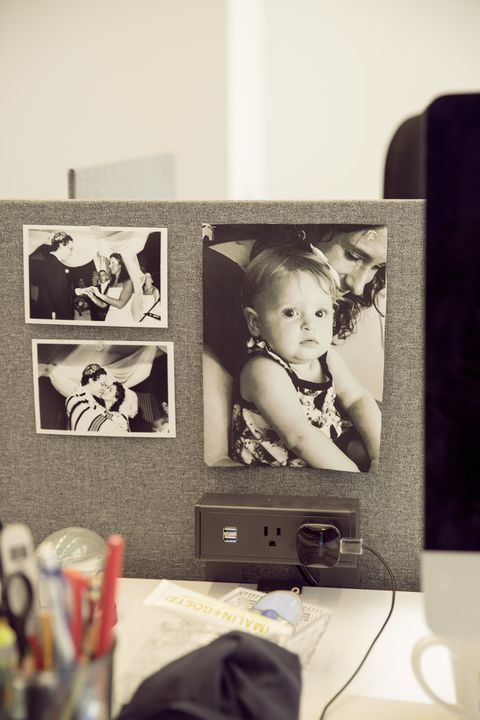
A photo of Kantor and her daughter at her desk
That's initially what she thought she was getting with Weinstein—a look into his past. What she got instead was his present. “When we started, we said to ourselves, This is a story about stuff that happened a very long time ago, so it’s about correcting a record,” says Kantor. “But when we found out about the 2015 incidents, it shifted the moral gravity of the piece. We began to see a serial pattern that had gone on for years.”
The discovery—a scathing internal memo they obtained containing sexual assault accusations written by former Weinstein employee Lauren O’Connor just two years ago—was "journalism gold," as Twohey calls it. In the document, O'Connor writes: “I am a 28-year-old woman trying to make a living and a career. Harvey Weinstein is a 64-year-old, world famous man and this is his company. The balance of power is me: 0, Harvey Weinstein: 10.”
They tracked down other internal company records and settlements that had been paid out. “We went in saying, ‘Is this a repeat situation? Is this a serial situation?’” says Kantor. “Some people in the industry knew he had a reputation, but the magic of reporting is that we can put those puzzle pieces together. When we realized the scope of this story, it was like, ‘Oh man, this has been going on for years to a lot of women.’”
Consumed by the pressure to give these women the justice they deserved, Kantor and Twohey worked day and night to find sources willing to talk. "There's tension in investigative reporting where, on the one hand, you're trying to take everything wide open, but, on the other hand, we're dealing with confidential sources," says Kantor. "It's hard keeping that many secrets, so Megan was the person that I could go to and talk about everything I was learning."
RELATED STORY

When they weren’t in the office, they were texting and emailing each other about the material. After tucking their kids into bed, new ideas kept them awake at night. If they did sleep, the story lingered. “Harvey began appearing in my dreams six weeks ago,” says Twohey. “It was disturbing—and also motivating—that I couldn’t turn it off at night. In my dreams, I was still chasing those records, still chasing interviews.”

Twohey at her desk
They secured dozens, including former Miramax and Weinstein Company employees and big-name stars. Especially important was garnering the trust of Ashley Judd, one of the first celebrities to speak to them on the record about Weinstein's alleged advances in his hotel suite. “When we got hold of Ashley, we told her, ‘Hey, we're not just asking you to go out on a diving board alone and tell the world what happened,’” Kantor says. “We explained that we’d built a really strong investigative story and that we wanted her to, in a way, speak to this much larger thing.”
The reporters are careful to protect exactly how and when they talked to sources like Judd, but they do divulge that they reached out to many actresses directly as opposed to using the traditional avenue of agents or reps. Much of their reporting was figuring out how to get access to the direct emails, phone numbers, and addresses of stars. "You're never as many degrees removed from someone as you think," says Kantor. "But we approached everyone delicately, because when we were knocking on doors, some people were desperate to leave this in the past."
And then in September, Kantor and Twohey started going toe-to-toe with Weinstein in person. Over the course of several weeks, there were two meetings with him at the Times headquarters. "Even if you only have a brief encounter with the person you're writing about, it is a kind of Come to Jesus moment," says Kantor. "By that time we’d heard what it was like to be alone with him in a hotel room, the things he’d done and said. He’d become such a presence for each of us, in our minds, that meeting him was very important.”
The institution was willing to lose advertising to do this story.
When they confronted him about the allegations—both in person and in additional conversations on the phone—he "kept swinging back and forth between denial and apology," Kantor says. "We were trying to be dutiful about taking him at his word. But, the question was, what was his word?"
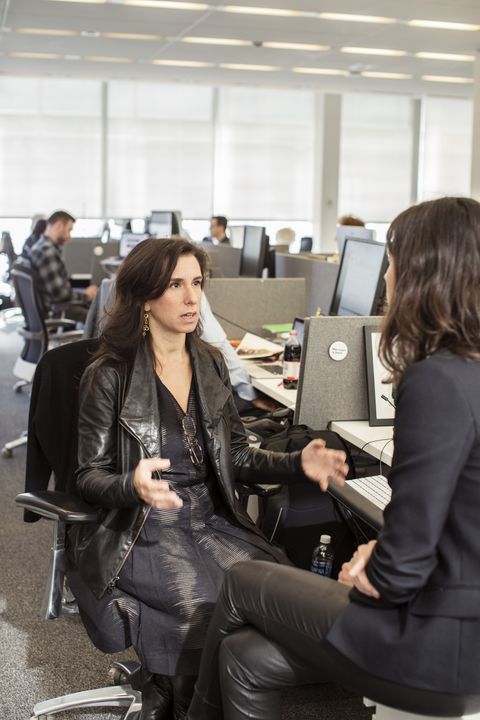
Kantor at her newsroom desk with Twohey
Kantor and Twohey spoke to him, his lawyers, and his publicists on multiple occasions during their investigation. "Harvey and his team were talking to us and to [editor] Rebecca Corbett all at the same time," Kantor says, though Weinstein feigned ignorance about the piece when The Hollywood Reporter asked him about its impending publication, saying in a statement: "The story sounds so good, I want to buy the movie rights." Behind the scenes was, of course, a very different story. "It got very intense," Kantor says. "I can't remember if he asked us to kill the piece exactly, but I do recall his constant attempt to minimize the the women's experiences and the material we had."
Their conversations with Weinstein, says Kantor, held her and Twohey morally accountable as journalists: “Harvey Weinstein has been accused of doing terrible, terrible things, but he’s still a human with children. Looking him in the eye and just saying, ‘I think I know what kind of story we're going to publish about you and it's going to be a really, really tough story’ is an important act for a reporter, but we knew it was the right thing to do, to do right by these women."
As Twohey puts it: “We were determined, from the start, to give a voice to the voiceless.”
RELATED STORY
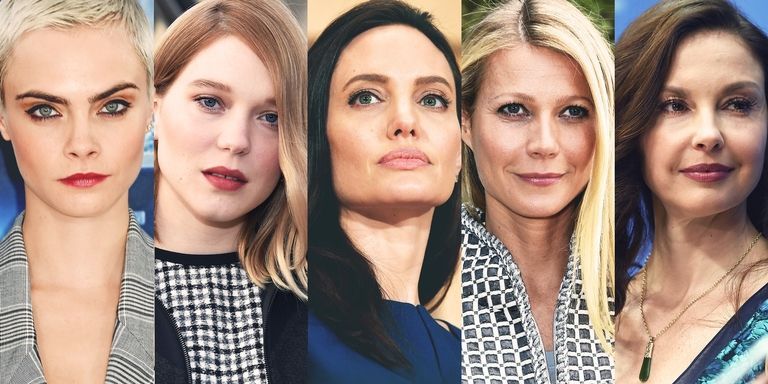
At the same time Kantor and Twohey were pursuing their story, journalist Ronan Farrow was looking into other allegations against Weinstein for the The New Yorker. They were vaguely aware of his pursuits, Kantor told CNN in an interview, but ultimately their reporting hardly overlapped—a sad sign that the issue was bigger than both their efforts, and even more important to tell.
But after a long 30 years of alleged abuse, many have wondered what made this the moment for the story to break. “The old fear was that your career would be hurt irretrievably if you were honest,” Kantor explains. “Those old rules are starting to change and it's why we were able to put this piece out now."
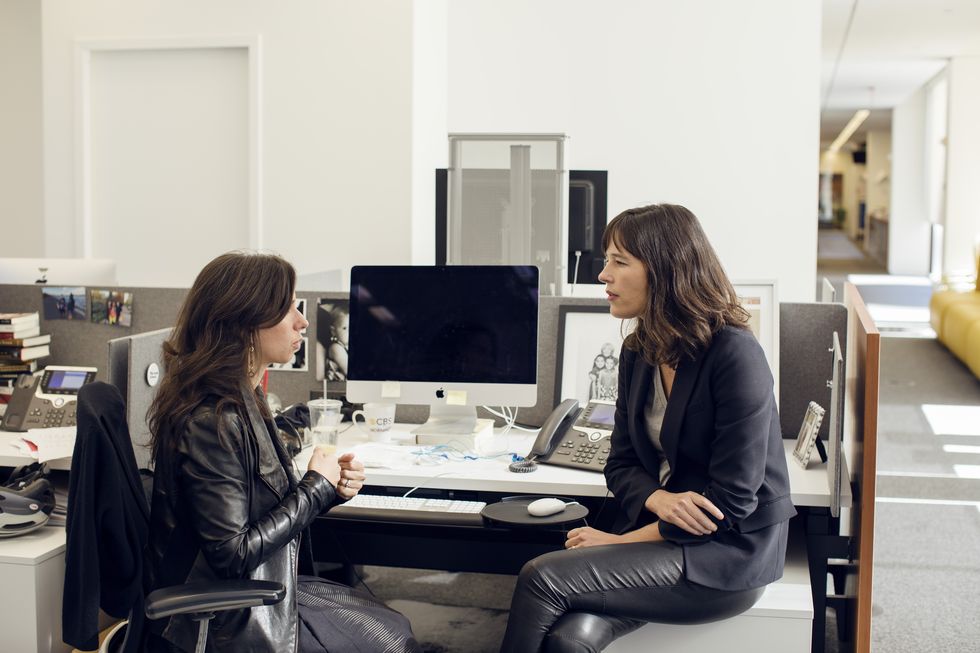
Kantor, left, and Twohey, right, in the newsroom
It also helped that Weinstein's once-firm grip on the industry was slowly slipping, say Kantor and Twohey. Actresses were more comfortable talking about someone who was "less powerful than he had been years before," Kantor says. "The fact that his hold on Hollywood had already begun to diminish definitely helped."
We're at the beginning of a big moment.
This is "the beginning of a big moment,” says Kantor. “And that's really inspiring to us, as mothers, because we want our daughters to know they can stand up to bullies and fight for what's right."
Before heading back to the newsroom, Twohey gives Kantor a look and says: “We’re still hard at work on this, asking the big questions. The story is far from over.”
Rose is a Staff Writer at ELLE covering culture, news, and women's issues. She is an accomplished and compassionate storyteller who excels in obtaining exclusive interviews and unearthing compelling features.
